
New Delhi, August 10: Amid continuing violence in Assam, the Centre has told the Supreme Court that it would not be possible to delete names of 40 lakh doubtful voters from the state on the basis of their religious or linguistic profile as it would be unconstitutional.
The Centre rejected the allegation of NGO Assam Public Works that over 40 lakh illegal migrants from Bangladesh had got their names entered into the electoral rolls and they should forthwith be deported.
In an affidavit placed before a bench of justices P Sathasivam and Ranjan Gogoi on Thursday, the Centre, however, assured the court that it was committed to weed out illegal migrants from the state.
The apex court, while taking on record the affidavit, posted the matter for further hearing to November 6.
“That the proposed modality suggested by the petitioner NGO to identify and delete alleged doubtful voters; from the voter list 2006 based on religious and linguistic profiling is prima facie illegal, arbitrary and violation of secular and democratic fabric of lndia.
“That the prayer made by the petitioner cannot be allowed as it violates the Constitution mandate,” the affidavit filed by the Union Home Ministry said.
The Centre said as a matter of policy it does not support any kind of illegal migration either into its territory or illegal immigration of its citizens to foreign territories.
“Curbing illegal migration into the country is a priority since it has serious security, economic and societal ramifications,” it said.
The government said it has been issuing instructions from time to time to all states and Union territories on the need to detect and deport Bangladeshi nationals found to be staying in India.
The Centre, however, said it has developed a mechanism to identify the doubtful voters by listing their names in category “D” who are neither allowed to vote nor stand for any elections.
“Identification of persons with doubtful Indian nationality in the electoral rolls began with the intensive revision of electoral rolls in 1997 -- persons who could not provide evidence in favour of their Indian nationality at the time of verification were marked as “D” in the electoral rolls so as to indicate their doubtful/disputed nationality status and these cases were referred to the competent tribunal for determination of their nationality.
“Such D voters are neither allowed to contest elections nor cast votes during elections. The electoral rolls figures from 2005 are accurate and authentic.
“Any so called abnormal growth, in the electoral rolls does not imply that the rolls contain the names of illegal Bangladeshi immigrants and the contention made regarding presence of illegal Bangladesh migrants in the electoral rolls is completely presumptuous,” the Centre claimed.
According to the government, to curb illegal infiltration it has strengthened the BSF equipping it with modern and sophisticated equipment/gadgets; raising of additional battalions, intensified patrolling and taken up other measures.
It said 36 foreigners tribunals have been set up to detect, declare and deport foreign nationals who have illegally infiltrated into Assam after the cut-off date of March 24, 1971.
“The government is committed to the detection and deportation of illegal migrants of post 24th March, 1971 in conformity with the provisions of the Foreigners Act, 1946 and Foreigners Tribunal Order 1964 through the 36 foreigners tribunals,” it said.





Comments
Add new comment